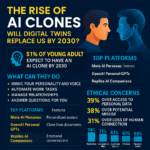Now Reading: AI and Cybersecurity in 2025: Protectors or Threat Vectors?
-
01
AI and Cybersecurity in 2025: Protectors or Threat Vectors?
AI and Cybersecurity in 2025: Protectors or Threat Vectors?

🔐 AI and Cybersecurity in 2025: Protectors or Threat Vectors?
In the evolving landscape of digital warfare, Artificial Intelligence stands as both the most promising defense mechanism and the most potent weapon. In 2025, cybersecurity professionals face an unprecedented duality: AI as protector vs AI as attacker.
With attacks growing in sophistication and defense systems becoming more autonomous, the question is no longer whether AI will shape cybersecurity—but whether it will save or endanger the digital world.
🛡️ AI-Powered Defense: Smarter, Faster, Autonomous
Modern cybersecurity companies are integrating AI into every layer of digital defense. Leading systems like Darktrace, SentinelOne, and CrowdStrike Falcon use advanced machine learning models to:
- Detect anomalies in real time using behavioral analytics
- Automate threat detection and response within milliseconds
- Adapt continuously to new attack vectors through unsupervised learning
Key Capabilities:
- Darktrace’s AI can block threats in under 1.2 seconds after anomaly detection
- SentinelOne reported a 96% malware neutralization rate without human intervention in Q1 2025
Use Case: A global bank using CrowdStrike AI reported a 71% decrease in phishing incidents thanks to real-time user behavior modeling
🧨 The Dark Side: AI as a Cyberattack Weapon
AI isn’t only used by defenders. Offensive AI is now a growing concern across the cybersecurity ecosystem. Attackers are increasingly leveraging AI to create:
🌀 Deepfake Fraud
- Real-time voice cloning used in CEO impersonation scams
- Deepfake video used to validate fraudulent Zoom calls
🎯 Generative Phishing
- Language models like open-source LLMs used to craft highly personalized phishing emails
- AI-enabled spear phishing campaigns using scraped LinkedIn and CRM data
📈 Data Poisoning and Adaptive Malware
- Malware that evolves using AI reinforcement learning
- Poisoned datasets planted to compromise training data of enterprise AI tools
2024 Stats:
- Over 62% of cyberattacks involved some form of AI automation (Source: CyberEdge Report)
- 30% of organizations were victims of deepfake-based fraud (up from 5% in 2022)
⚠️ The Rise of Offensive AI: What It Means
Offensive AI refers to artificial intelligence tools deliberately engineered to evade detection, mimic human behavior, and bypass security systems.
Key Threats:
- Autonomous bots that bypass CAPTCHAs and MFA
- AI scripts designed to reverse-engineer system logic
- LLMs fine-tuned for code injection or social engineering
Expert Forecast:
By 2026, more than 50% of malware families will use AI components to increase success and longevity.
🧰 How Companies Are Preparing
✅ Proactive Defense Strategies:
- Adopting AI-on-AI defense (using defensive AI trained to predict attacker AI behavior)
- Building red team AI agents to simulate real-world offensive scenarios
- Real-time threat intelligence sharing via federated AI networks
🧠 Human + AI Synergy:
- Augmenting analysts with AI copilots
- Training blue teams to detect AI-manipulated content
- Using LLMs in SecOps to analyze alerts, correlate logs, and prioritize responses
🧩 Final Thoughts
In 2025, cybersecurity is no longer a human-only battle. AI has taken center stage as both defender and attacker. Organizations that embrace this duality—investing in next-gen AI defense while understanding the mechanics of offensive AI—will lead the race for digital resilience.
Stay updated with Ai24-News.com for expert insights on cybersecurity, AI threats, and defense strategies that will shape the digital frontier.






























